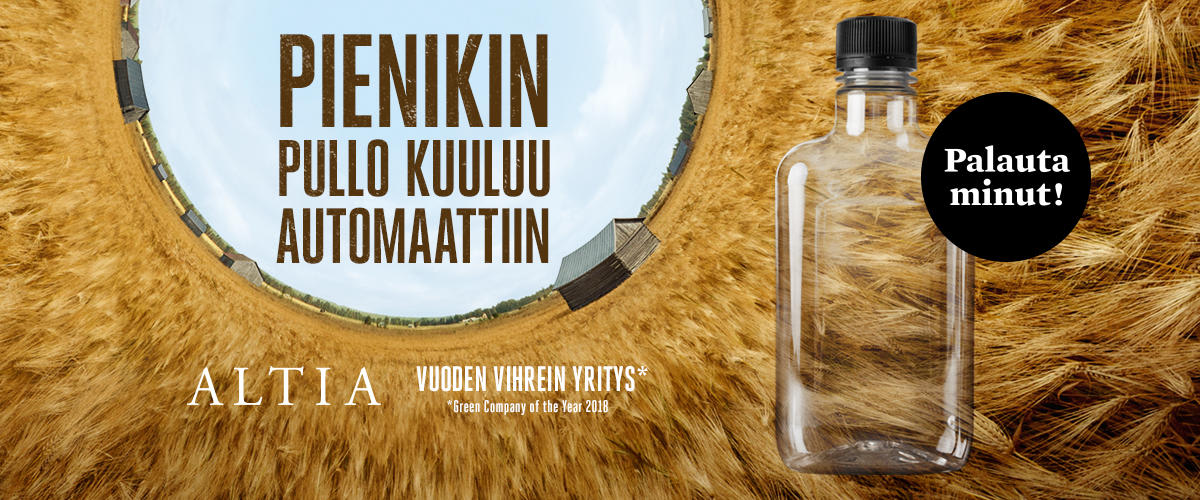
17.06.2019 - 07:45
Study: small plastic bottles are often left unreturned to the deposit system
Finland is one of the world's leading countries in bottle recycling, with an overall return rate of almost 100%. However, small, pocket-sized liquor and vodka flasks do not find their way to the reverse vending machines, despite their deposit. The reason for the lower return rate is the use of these products: small, light plastic bottle are convenient to take with you on a trip, for example, or an event, where the bottle ends up in the trash more easily than in a return vending machine.
As part of its responsibility program, Altia is now launching its first campaign directed at consumers to increase the recycling rate of small plastic bottles.
In Finland, the return rate of all bottles and cans is world-class. Finns return 93% of the bottles that are part of the deposit system. According to Palpa – the non-profit company responsible for managing the beverage recycling system in Finland – the return rates of deposit beverage packaging in Finland are about 95% for cans, 90% for plastic bottles, 88% for glass bottles and slightly less than 100% for refillable glass bottles *.
A clearer difference can be seen when comparing the return rates of different kinds of plastic bottles. Approximately 460 million deposit bottles belonging to the Palpa return system are returned to reverse vending machines in Finland annually, which means that several million, or every tenth PET plastic bottle sold, ends up somewhere else than in the deposit system.
"For example, the return rates of Altia's small PET plastic bottles are surprisingly low: about half of the pocket-sized bottles will not be returned, although these bottles are also part of the system. We hope that these figures will change," says Hannamari Koivula, Altia's Sustainability Manager.
On the road, bottles are often left unreturned
In order to find out the reasons for the low return rates of small PET bottles **, in May 2019, Altia commissioned on bottle recycling practices among about a thousand Finns over the age of 18. The survey asked e.g. what kind of drink bottles are most easily left unreturned and in what situations the bottles are repeatedly left unreturned.
Around one in three respondents (32%) mentioned some type of bottle that is often left unreturned. The most common type of bottle not returned is a pocket-sized bottle (34% of respondents who stated a bottle type that they easily do not return). By far the most common situations where respondents said the bottle was repeatedly not returned were those where the respondent did not know that the bottle was included in the deposit system (20%), had brought the bottle from abroad (37%) or reported being at a public event, festival or public holiday (19%), at a party or away (18%) or on the go (19%). In other words, situations where respondents were at some event outside the home or otherwise on a trip were mentioned among respondents (56% in total) as the most common situations where a bottle is repeatedly left unreturned.
Small bottles belong in the reverse vending machine, too
According to Altia's sales statistics, sales of small 20 cl and 35 cl bottles made of PET plastic increase during the spring and summer festive seasons and during the Christmas season. Lightweight PET bottles also travel easily on the go and are therefore popular in situations where respondents often said the bottle would not be returned.
In its first consumer campaign, Altia wants to highlight the recyclability of bottles and remind consumers that also small bottles belong in a vending machine – whatever the situation. The campaign will appear in both outdoor advertising and on social media on Midsummer week. The aim of the campaign is to increase the recycling rate of small bottles, especially those that travel easily, and all bottles in general.
The carbon footprint of a recyclable PET plastic bottle 60% lower than that of a glass bottle
The bottle recycling campaign is part of Altia's responsibility program, in which the development of more sustainable packaging is one of the most important themes. Good packaging design and increased recyclability can significantly reduce the amount of waste generated and the carbon footprint of packaging.
“In recent years, Altia has increasingly utilised alternative packaging materials. For example, fully recyclable PET plastic bottles have a carbon footprint of up to 60% less than glass bottles. PET can be recycled virtually indefinitely. Already more than 96% of the tops of PET bottles are made of plastic. Empty bottles and caps should be returned for recycling, so that as much of the used material as possible can be recycled,” says Hannamari Koivula.
The upcoming campaign is a continuation of Altia's long-term responsibility work, which brought Altia the Green Company of the Year award at the prestigious The Drinks Business Green Awards 2018 in London at the end of 2018. The award was given mainly thanks to the bio- and circular economy work at Altia's Koskenkorva plant.
*) "Pantillisten matkassa" study material, available in Finnish here
**) PET plastic, i.e. polyethylene terephthalate, is used especially in the packaging industry. Soft drink bottles and oven-resistant plastic pans are often made of PET.
More information:
Hannamari Koivula, Sustainability Manager, hannamari.koivula@altiagroup.com, +358 40 581 9921
Petra Gräsbeck, Communications Director, petra.grasbeck@altiagroup.com, +358 40 767 0867
About the study
The survey was commissioned from YouGov's electronic panel in May 2019. The survey was answered by 1,001 Finnish men and women over the age of 18. The sample of the survey was designed to correspond to the overall picture of Finns in terms of gender, age and geographical area.
